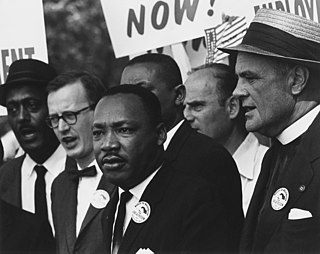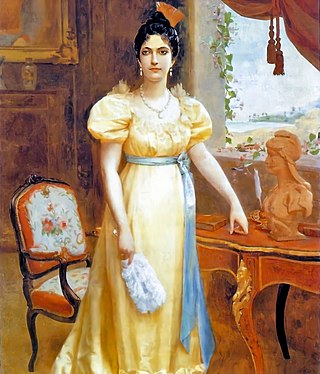
In politics, humanitarian aid, and the social sciences, hunger is defined as a condition in which a person does not have the physical or financial capability to eat sufficient food to meet basic nutritional needs for a sustained period. In the field of hunger relief, the term hunger is used in a sense that goes beyond the common desire for food that all humans experience, also known as an appetite. The most extreme form of hunger, when malnutrition is widespread, and when people have started dying of starvation through lack of access to sufficient, nutritious food, leads to a declaration of famine.

Ann Margaret Veneman is an American attorney who served as the fifth executive director of UNICEF from 2005 to 2010. She previously served as the 27th United States secretary of agriculture from 2001 to 2005. Veneman served for the entire first term of President George W. Bush, and she left to take the UNICEF position. Appointed by the U.N. Secretary-General Kofi Annan on January 18, 2005, she took over the post on May 1, 2005. A lawyer, Veneman has practiced law in Washington, DC and California, including being a deputy public defender. She has also served in other high-level positions in both the state and the federal government of the United States, including being appointed secretary of the California Department of Food and Agriculture, serving from 1995 to 1999, as well as United States deputy secretary of agriculture, serving from 1991 to 1993. Throughout her public career, Veneman was the first woman to serve in a number of positions, including secretary of agriculture, deputy secretary of agriculture, and California's secretary of food and agriculture. She was also just the second woman to lead UNICEF, following her predecessor, Carol Bellamy.

Latter-day Saint Charities is a branch of the welfare department of the Church of Jesus Christ of Latter-day Saints. The organization's stated mission is to relieve suffering, to foster self-reliance for people of all nationalities and religions, and to provide opportunities for service.
Children International is a global nonprofit humanitarian organization that helps children break the cycle of poverty. It addresses children’s critical needs through early intervention and regular interaction in community centers. The goal is to help children overcome the effects of poverty, support their education, and prepare youth to contribute to society.
Dame Claire Bertschinger, DBE, DL is an Anglo-Swiss nurse and advocate on behalf of suffering people in the developing world. Her work in Ethiopia in 1984 inspired Band Aid and subsequently Live Aid, the biggest relief programme ever mounted. Bertschinger received the Florence Nightingale Medal in 1991 for her work in nursing, and was made a Dame by Queen Elizabeth II in 2010 for "services to Nursing and to International Humanitarian Aid".

Gender equality is established in the constitution of Venezuela and the country is a signatory of the United Nations's Convention on the Elimination of All Forms of Discrimination Against Women. However, women in the history of Venezuela have played asymmetrical roles in society compared to men. Notable women have participated in the political history since the Venezuelan War of Independence in the 19th century, but universal suffrage was not granted until 1947.

Juan Requesens Martínez is a deputy of the Venezuelan National Assembly, elected in 2015 and sworn in on 5 January 2016. He was a student leader at the Central University of Venezuela (UCV), and a leader of student opposition protesters during the 2014 Venezuelan protests. He led marches opposing the Government of Venezuela under President Nicolás Maduro, seeking "to turn the student rebellion into a broader social movement".

Caritas Internationalis is a confederation of over 160 Catholic relief, development and social service organizations operating in over 200 countries and territories worldwide.

Presidential elections were held in Venezuela on 20 May 2018, with incumbent Nicolás Maduro being declared re-elected for a second six-year term. The original electoral date was scheduled for December 2018 but was subsequently pulled ahead to 22 April before being pushed back to 20 May. Some analysts described the poll as a sham election, as many prominent opposition parties had been barred from participating in it. The elections had the lowest voter turnout in Venezuela's democratic era.

Juan Requesens, a deputy of the Venezuelan National Assembly, was arrested as a suspect in the Caracas drone attack, an alleged assassination plot on the Venezuelan President Nicolás Maduro. The circumstances of his arrest and detention are controversial, and irregularities surround the legal proceedings. Requesens was imprisoned in El Helicoide from his arrest on 7 August 2018, with allegations of torture to coerce a confession, and delays impeding the legal process and hearings until his release on 28 August 2020.

Luz Mely Reyes is a Venezuelan journalist, writer, and analyst. She is known as the director and co-founder of the digital media franchise Efecto Cocuyo. She has received multiple honors for her work.

The Homeland card is a Venezuelan identity document that includes a unique personalized QR code. It was created in 2016 by the Venezuelan government with the objective of knowing the socioeconomic status of the population and streamlining the system of the Bolivarian missions and that of the local committees of supply and production (CLAP).
Gilber Caro is a Venezuelan politician, activist and thrice political prisoner.

The COVID-19 pandemic in Venezuela was a part of the worldwide pandemic of coronavirus disease 2019 caused by severe acute respiratory syndrome coronavirus 2. The first two cases in Venezuela were confirmed on 13 March 2020; the first death was reported on 26 March. However, the first record of a patient claiming to have symptoms of coronavirus disease dates back to 29 February 2020, with government officials suspecting that the first person carrying the virus could have entered the country as early as 25 February.
Un Mundo Sin Mordaza is a Venezuelan non-governmental organization founded in 2009, whose stated mission is denouncing attacks on freedom of expression and human rights violations. The organization has global volunteers who coordinate campaigns that use music, art and culture to promote human rights and democratic values, as well as raise awareness about the complex humanitarian emergency (CHE) in Venezuela. The organization trains and educates human rights activists worldwide, while also supporting initiatives of documentation of fundamental rights violation in Venezuela.

The Guanare prison riot, also known as the Guanaremassacre, occurred in the Los Llanos prison in Guanare, Portuguesa state, Venezuela, on 1 May 2020. The events caused around 47 deaths, and 75 people were injured.
Alejandra José Conde Licón is a Venezuelan TV host, model and beauty pageant titleholder who was crowned Miss Venezuela World 2020. She represented the state of Aragua at the pageant and was selected to represent Venezuela at the Miss World 2022 competition.
Sam Mort is currently Chief of Communication, Advocacy and Civic Engagement for UNICEF Afghanistan, based in Kabul. Officially based in New York, she is currently 'one of the few Westerners left' after evacuations from Kabul. Afghanistan is in the midst of a Taliban offensive, where the insurgents have now taken over from the elected government. She previously announced that Unicef had made a historic deal to have girls educated in the Taliban-controlled areas of the country in 2020.

Colateral is a 2019 Venezuelan documentary directed by journalist Lucrecia Cisneros. The documentary is about extrajudicial executions in Venezuela and their consequences on the affected families. The documentary was awarded several recognitions in film festivals, including in Venezuela the category of best documentary in the Short Film Contest of the National Film School and the International Festival El Grito.
Vannesa Rosales-Gautier is a Venezuelan activist and teacher from Mérida state.












